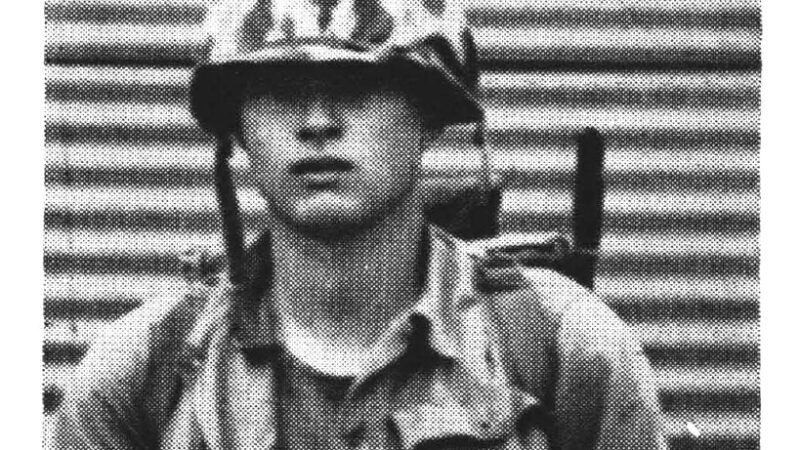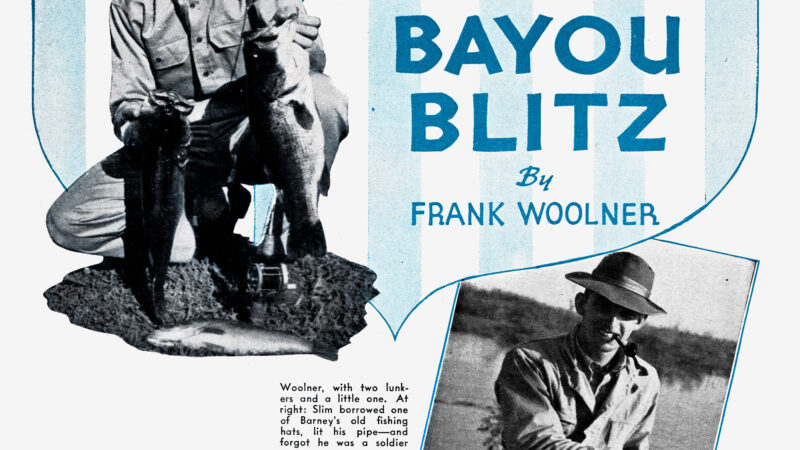Savage M110 Trail Hunter Lite Review: An Accurate and Affordable Hunting Rifle
We may earn revenue from the products available on this page and participate in affiliate programs. Learn More ›
The Savage M110 Trail Hunter Lite embodies what hunters have always valued in the enduring Model 110 series: accuracy, utility, and value. There have been many variations of the M110 through the decades but for the everyday hunter they don’t get much better than the Trail Hunter Lite. It’s the most affordable variant of the M110, has good ergonomics, comes suppressor ready, and fills the role of an all-purpose hunting rifle well. I tested my own Savage M110 Trail Hunter Lite, chambered in 5.56x45mm NATO, in frigid interior Alaska and while hunting whitetail bucks and hogs in the cedar-choked caprock country of West Texas.
Savage M110 Trail Hunter Lite Specs
- Action: Two-lug bolt action, with floating bolt head
- Stock: Hogue overmolded, black
- Cartridge: 5.56mm NATO (tested), .243 Win., 6.5 Creedmoor, 7mm-08 Rem., .308 Win., .350 Legend, .400 Legend, .270 Win., .30/06 Springfield, 7mm Rem. Mag., 7mm PRC, .300 WSM, .300 Win. Mag., and .450 Bushmaster
- Capacity: 5+1 (in 5.56mm NATO)
- Weight: 7 pounds, 4 ounces (measured)
- Trigger: Savage Accutrigger (adjustable), 3 pounds 11 ounces (measured)
- Barrel: 1:7 twist, 20-inch steel, heavy sporter, fluted, threaded ½-inch x 28
- Length: 41 inches
- Price: $644
- Optic Used: Vortex Razor HD LHT 3-15x42mm
Key Features
- Hogue overmolded stock
- Shorter barrel than regular Trail Hunter models, with fluting to cut weight
- Tungsten-colored Cerakote finish on receiver and barrel
- User-adjustable Savage Accutrigger
- Flush-fitting detachable magazine
- Includes pre-installed Weaver-style bases

Review Highlights
- Solid all-around hunting rifle
- Good accuracy
- Nice balance of performance and affordability
- Twenty-inch barrel pairs well with a suppressor
- Fore-end has too much flex
The Model 110 Trail Hunter Lite is Accurate and Affordable
I’ve generally found Savage Model 110s to be reliably accurate, no matter the grade. In their premium variants, Savage has frequently used Proof Research carbon-wrapped barrels. Models like the M110 Ultralite Elite and the M110 Carbon Predator have been impressively precise in our testing, but what can you expect from a run-of-the-mill, steel-barreled model like the Trail Hunter Lite, which retails for only a bit over $600?
We take our accuracy testing seriously at OL because we want to provide you with realistic expectations of how a rifle will perform, rather than lead you on with a few of our very best groups. To do that, we shoot a series of five-shot groups, then aggregate those into a 20-shot composite group for each ammunition sample. We still get to see what five-shot group sizes look like, but also have a legitimate picture of the rifle’s true cone of fire with a given ammunition. This also provides us enough data to calculate a valid mean radius, which is an average distance that each shot lands from the center of the group.
Overall Average 100-Yard, Five-Shot Group Size: .866 inches (29 groups with 7 types of ammunition)
Overall Average 20-Shot Group Size: 1.319 inches (9 total 20-shot composites)
Average Mean Radius: .377 inches
I did all accuracy testing between minus five degrees and about 25 degrees fahrenheit, with a suppressor. Considering that this rifle is chambered in 5.56mm NATO with a 1:7-twist barrel, I made sure to test a wide variety of bullet weights. Ideally, this gun should be able to shoot accurately with both heavier deer-appropriate bullets and light, frangible varmint slugs — and it did just that. I appreciate that across a wide swath of ammunition and bullet weights, the rifle was consistently accurate.
Someone who is used to reading about half-MOA hunting rifles, based on a few cherry-picked groups, might balk at a large-sample dispersion of 1.2 to 1.5 inches, but only out of ignorance. That’s really good accuracy for a budget-friendly rifle — and it’s perfectly suitable for an all-around coyote-to-deer crossover gun. I’ve found medium-priced hunting rifles that print 20-shot groups under one MOA to be essentially non-existent.

Accuracy Data
Note that the mean radius, which accounts for every shot in the group, varies by only a little more than a tenth of an inch across all the loads. In every case, the average of these 140 shots misses the center of the group by less than half an inch at 100 yards. Results are ordered by bullet weight from lightest to heaviest.
| Ammo | Average 5-Shot Group Size | 20-Shot Group Size | Mean Radius |
| Hand Load, Speer 52-grain HP | .746 inches | 1.26 inches | .34 inches |
| Nosler 55-grain Ballistic Tip | .749 inches | 1.25 inches | .35 inches |
| Freedom Munitions 55-grain V-Max | 1.022 inches | 1.5 inches | .4 inches |
| Black Hills MK 262 MOD 1-C 77 grain SMK | .889 inches | 1.39 inches | .42 inches |
| Nosler 77-grain Match BTHP | .777 inches | 1.21 inches | .3 inches |
| Hand Load 80-grain Hornady ELD-X | 1.003 inches | 1.45 inches | .43 inches |
| Barnes 85-grain Match OTM | .907 inches | 1.4 inches | .4 inches |
The Savage M110 Trail Hunter Lite: Simple and Effective
The Savage M110 Trail Hunter Lite isn’t fancy but, in an age of tricked-out custom rigs and unprecedented modularity, its simplicity appeals to me. The most prominent feature of the Trail Hunter Light is its Hogue overmolded stock, which is beefy, has good ergonomics, and a tacky rubberized coating that provides a secure grip in wet weather, but isn’t too cold against your cheek in sub-zero temperatures. Second to that, the Trail Hunter Lite models all use fluted 18- to 20-inch barrels, which are shorter than the 20- to 24-inch heavy-contour barrels on the standard Trail Hunter. The Trail Hunter Light isn’t a particularly light rifle, but it is a lightened, shortened version of the original. The Trail Hunter Light includes other nice features like an all-weather Cerakote finish, adjustable Accutrigger, and a reliable flush-fitting detachable five-round magazine.
After getting my sample in preparation for a whitetail hunt in Texas, I mounted an optic, fitted the threaded muzzle with a suppressor — a B&T SRBS Ti 5.56mm 3D-printed can — and hit the reloading bench. As part of this review, I wanted to explore the effectiveness of some of the newer heavy-for-caliber .224 hunting bullets like Hornady’s 80-grain ELD-X. They’re best in cartridges like the 22 Creedmoor and 22 ARC, but also reasonable for the 1:7-twist barrel of the 5.56mm Trail Hunter Light. These heavy and efficient bullets have elevated some of the capabilities of centerfire 22s as big-game rifles, and fired at .223 Rem. or higher 5.56mm NATO pressures, it should replicate the effects of an ARC or 22 CM at slightly longer distances. Most importantly, and unlike a standard AR15 magazine, the detachable magazine that the Trail Hunter Lite uses is long enough to accommodate these heavier, sleeker bullets.
I settled on a load using Hodgdon Benchmark powder, pushing the 80-grain bullet at 2,685 feet per second. That keeps velocity at about 2,200 feet per second at 300 yards. I neither anticipated nor wanted to shoot a buck farther than that.

Practical Use and Function
With ammunition loaded, I quickly shifted to field-position shooting with the Trail Hunter Lite. I practiced standing, kneeling, and sitting positions using a tripod, tac table, and lightweight shooting bag for support. The rifle balances well when rested on the flush magazine, and the large, textured grip on the Hogue stock facilitates a steady, consistent grip, even in the cold. I tried a couple different bipods on the M110 Trail Hunter Lite, a Spartan Precision Springbok and a Harris-styled bipod with carbon-fiber legs. Ultimately, I abandoned these because the fore-end of the stock is quite flexible and, when applying any pressure to the bipod, the fore-end can bend and and contact the barrel. It’s my only real complaint about the rifle. The tac table negated the need for a bipod, so I stuck with that. I consistently hit center mass on a six-inch steel plate out to 350 yards from all positions during my snowy practice sessions.
Model 110 rifles, in general, have a relatively stiff bolt lift compared to many actions, but this one ran quite smoothly, especially when securely rested atop a shooting bag. This is likely helped along by reduced cocking force in the 5.56 model, but also the heft of the rifle and the grippy texture of the stock mating with the waxy canvas of the shooting bag. With lighter model 110s in larger chamberings, I found I need to purposefully squeeze the rifle onto the bag to prevent it from shifting while lifting the bolt. More importantly, the Trail Hunter Lite functioned smoothly and fed reliably in sub-zero temperatures, a condition that will amplify any stickiness or hesitancy in an action.
The Savage M110 Trail Hunter Lite in the Field
Frigid cold was the last thing on my mind when I caught the glimpse of a gray-backed deer working its way toward us through the cedars. “I’m pretty sure he’s a ten,” my guide Miller Valentine whispered, watching through his tripod-mounted binoculars. As the buck emerged from the thicket, he turned his head toward us, displaying the mass of his main beams. There was no doubt that he was a shooter.
Sitting in a ground blind atop a hill overlooking the deer, I already had the rifle set up on my game changer bag. I eased onto the gun as the buck gingerly stepped from behind a small mesquite, quartering towards me at 115 yards. I broke the shot as the reticle settled on the buck’s left shoulder. The minimal recoil of the 5.56 rifle didn’t push me out of my sight picture, and I saw the bullet hit the deer just before hearing the reassuring plop of the impact. His rear end hit the ground as he spun while I quickly chambered another round. It was unnecessary. The shot passed through his scapula, both lungs, and exited the middle of the offside rib, after about 16 inches of penetration — leaving a steady 55-yard blood trail.

Truck Gun
After taking my buck the first evening of the trip, I spent the remainder tagging along with Miller, who runs Miller Brothers Outfitters. We checked feeders for hogs and spent hours glassing up roaming bucks that were staging for the upcoming rut. I’d never had the chance to shoot a wild pig, but that changed abruptly when we rounded the corner of a two-track in a thick mesquite-filled bottom. We saw a dark-colored hog gobbling up bits of corn under a feeder 225 yards away. I quickly deployed my tripod at standing height, maneuvering left and right as the hog wandered in and out of sight. After a few seconds, I settled atop my tac table, and held the half-MIL hash on the pigs neck. With a whop, the swine flopped to the ground.

The Trail Hunter light carries well on a sling using standard swivel studs, and is nimble enough to handle quickly. But it is also hefty enough to make a stable predator rifle. We did a little calling for coyotes, but my chance at one came before we even started squalling. We had dropped over the edge of some caprock, overlooking a rolling valley that was thick with cedars. I was setting my tripod when a coyote spooked, not 100 yards away from us. I quickly got the legs locked out and when the coyote stopped to look back from a far-off opening, I guessed the range to be about 300 yards, I held a MIL high, and sailed the round right over his back. It was only 200 yards. About a minute later, I doubled down by missing another at 375 yards. That one was all me.

Final Thoughts
Through all the testing and practicing in the cold, moving in and out of the truck, walking, setting up in blinds, sitting down to call coyotes, loading, shooting, and unloading, I found the Savage M110 Trail Hunter Lite to be a pleasing all-purpose rifle. It’s simple, accurate, easy to shoot, and it just works well. Does it have its flaws? Sure, it does. But if what you need is an affordable, durable, do-all rifle, you’ll have a hard time beating this one for the price.
The post Savage M110 Trail Hunter Lite Review: An Accurate and Affordable Hunting Rifle appeared first on Outdoor Life.
Source: https://www.outdoorlife.com/guns/savage-m110-trail-hunter-lite-review/





